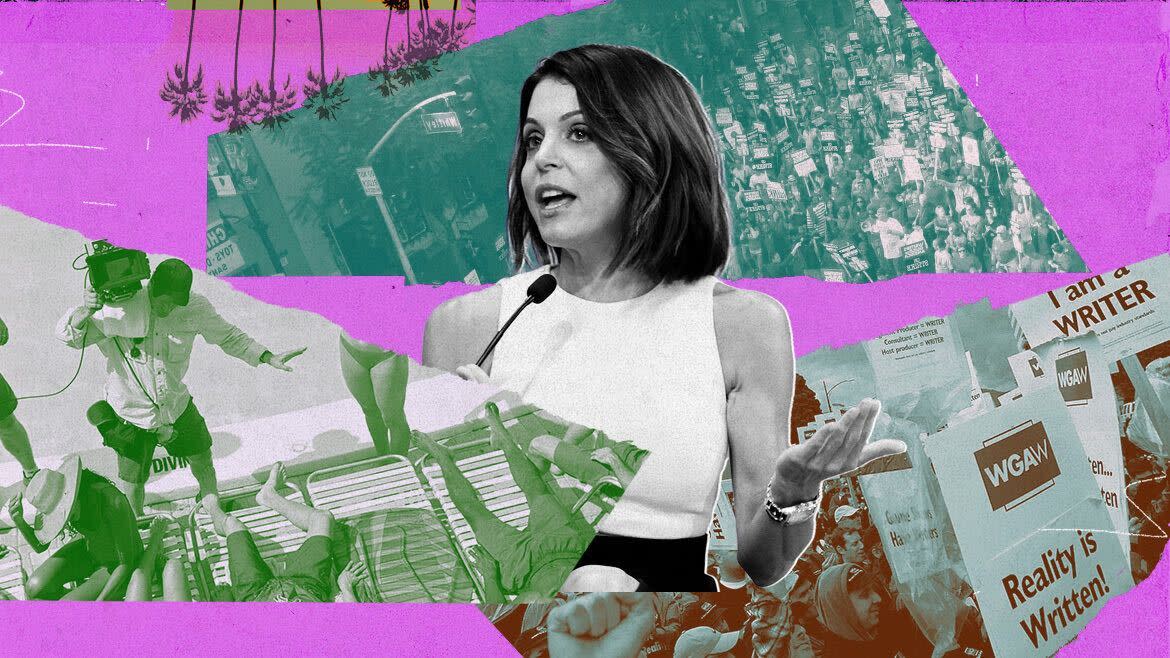Reality TV stars want better pay, too. Here's why some are ready to fight for it.
“The 360” shows you diverse perspectives on the day’s top stories and debates.

What’s happening
With writers and actors on strike, major TV studios are once again leaning on a strategy that helped them survive the last time Hollywood production ground to a halt: filling their schedules with reality TV shows that don’t need scripts or big-name performers.
But some of the people who make and star in the most popular reality shows are hoping to use this moment to secure more money and better working conditions.
Bethenny Frankel, who gained fame as one of the original Real Housewives of New York City, has called for reality TV talent to form a union and go on strike to secure better salaries and residual payments for stars who make reality shows so popular. “Just because you can exploit young, doe-eyed talent desperate for the platform TV gives them, it doesn’t mean you should,” she told Variety late last month.
Frankel also enlisted a pair of high-profile Hollywood lawyers to bring a “day of reckoning” to reality TV. The attorneys say they intend to file a lawsuit against NBCUniversal — which owns reality-heavy networks like E! And Bravo — over the allegedly “grotesque and depraved” treatment unnamed reality cast and crew members say they experienced during production. Last year, a contestant on Love is Blind sued Netflix, alleging he endured “sleep deprivation, isolation, lack of food and an excess of alcohol” while filming the dating show.
Why there’s debate
Reports of exploitative treatment and paltry pay have hounded reality TV productions for years, but some industry watchers say the time is ripe for change that could fundamentally shift the balance of power in unscripted television.
They argue that many reality stars are now major celebrities in their own right, which means they can rally a massive audience of fans to get behind their cause. The lack of new movies and TV being made during the strikes could also give reality talent and crew more leverage against studios who need unscripted programming to fill holes in their schedules.
But others say that, for all of its popularity, the main thing that makes reality TV valuable is how cheap it is to produce — a feature networks aren’t likely to give away under any circumstances. There are also some signs that it may be difficult to bring enough reality stars together to force studios into making any real concessions. Some experts add that the rise of streaming may have altered the TV landscape so much that reality might not be as crucial to studios, even with no new scripted shows being made.
What’s next
With the Hollywood strike dragging on for months and no resolution in sight, studios may become even more reliant on reality programming as their backlog of scripted projects that were completed before the shutdown runs out.
Perspectives
The idea that reality stars are replaceable and talentless has never been less true
“The people who make these reality shows are just as talented and necessary to their programs as people who make scripted shows, but they continue to be vastly undervalued and underpaid.” — Emily St. James, Vanity Fair
If reality TV gets more expensive, networks will just stop making it
“Unfortunately, while the two recent strikes led to a rise in reality TV, it didn’t lead to better compensation. Indeed, part of the appeal for networks is that the shows are cheaper to produce, so they’re eager to fight any attempt to make the shows more expensive.” — Ginny Hogan, Forbes
The shutdown of scripted productions gives reality stars unique leverage
“Reality is an extremely lucrative industry, and becomes even more important when the writers strike has knocked scripted programming off the schedule. As many have already said, ‘hot labor summer’ is proving to be an inflection point in the entertainment industry.” — Mary Kate Carr, AV Club
The rise of streaming shields networks from a potential reality TV strike
“The TV landscape has undergone dramatic changes over the last decade. … The need to summon more shows may be less urgent. Viewers may even breathe a sigh of relief if they finally have time to catch up on ‘The Wire’ — or ‘The Great British Baking Show.’” — Meredith Blake and Yvonne Villarreal, Los Angeles Times
The haphazard nature of reality TV production makes it hard to create any one set of rules
“While a reality TV union looks a genuine possibility in the US, forming one could be complicated. Partly, this is due to the freelance and fixed-term contracts, and the revolving door of cast members. There are also questions about how it would work.” — Daisy Schofield, Guardian
Studios can only get out of this mess by treating everyone who makes their content better
“As much as the people sitting atop this system might wish for it to be otherwise, the truth of the matter is that networks cannot outrun labor. They would have nothing to sell without it. The solution to this fundamental problem is not to turn to other people whose labor is valued lower than others. The only solution that deserves to be called a solution is to treat everyone better.” — Alex Sujong Laughlin, Defector
Most reality TV workers really are replaceable
“Once studios have found a way to create this content in a cheaper way, are you going to be able to change that? ... It becomes tricky. You sort of need the show to be seen as indispensable to your platform, and certainly not all shows have that luxury.” — Ryan Gajewski, Hollywood Reporter staff editor, to PBS NewsHour


